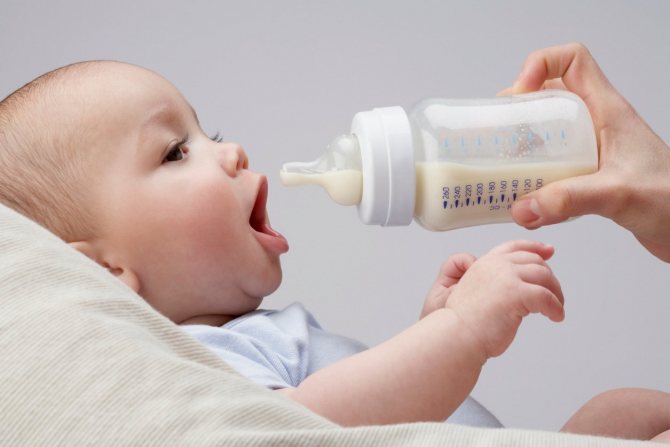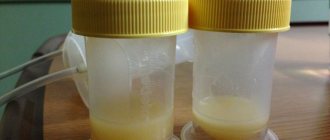Breastfeeding Basics
During breastfeeding, it is necessary to carefully monitor the baby’s behavior and activity.
How to tell if your baby is full
Many parents fear that their baby is not eating enough food. To know if he has enough food, you should monitor his reaction. When he sleeps soundly and does not require more milk than necessary, and gains weight, this means that everything is normal, and he consumes as much food as he needs for growth and development.
If the baby shows anxiety, it is necessary to check whether he is consuming enough food. For this purpose, children's scales are purchased. The baby should be weighed before and after meals. The difference between weighings will be the amount of food consumed.
Some pediatricians recommend doing something different: expressing milk and storing it in a feeding bottle. This way parents will know if the baby is hungry.
Mother's milk in a bottle
Important! Excessive worry about the amount of food consumed is in vain - the child will take the amount of food he needs.
How long does it take for a baby to eat?
The structure of the baby's oral apparatus is such that it firmly grasps the mother's breast. To strengthen the muscles involved in the sucking process, you need to regularly put your baby to the breast, otherwise he will suck his finger or fist.
The approximate time of a child's “meal” is from 15 to 30 minutes. The mother is not always able to strictly count the required time. As soon as the baby eats his quota, he will let you know about it.
Important! When feeding an infant, you need to make sure that he sucks the breast and does not hold it in his mouth.
How to avoid overeating
It is quite possible to avoid overeating in a breastfed baby. As soon as he gets enough, he stops suckling.
First feeding in the hospital
What does a child need in the first months of life - list
Feeding infants in the first days of life should satisfy their needs for the substances necessary for full development. The first breastfeeding should be done within a few hours of the baby's life.

First feeding
Note! Initially, a woman produces colostrum rather than breast milk. It's much thicker. Colostrum is ideal for the baby in the first days of life.
After a few days, colostrum turns into milk. To always have enough, you should express your breasts. It is important to follow these feeding rules:
- apply the baby to the breast correctly;
- feed him often;
- apply to both breasts.
How many times does a baby eat
It is difficult to answer the question of how many times a newborn baby eats per day. It is advisable to feed him when he feels hungry and hold him at the breast until he feels full. Typically, infants eat every 2 or 3 hours.
Each baby eats differently: some eat more often and more, others less often and less. Determining the appropriate feeding schedule for your baby can only be done through observation.
How much milk do you need
During the first postpartum days, the mother produces colostrum. During this time, the newborn eats very little of this nutritious food. This is not surprising, because at the time of birth, a child's stomach can accommodate no more than 10 ml of food.
The next day, the child eats several teaspoons of colostrum. On the third day, he needs up to 40 ml of mother's milk to get enough. As the baby grows with each passing day, the amount of milk consumed also increases. By the end of the second week, the toddler consumes up to 500 g of milk per day, with a single feeding - 50-70 ml of milk.

Lactation
Note! Until the age of six months, the baby consumes up to 1000 ml of food per day.
How much does a newborn eat after birth: increasing portion size
We talked about how many times a baby should eat, now let’s find out the size of the portion that a baby should eat so as not to be hungry. Speaking about norms, it should be noted that there is no single norm. After all, all children are different and can eat individually according to their characteristics. It should also be taken into account that appetite directly depends on well-being, mood, and the length of time between feedings.
Serving volume for a newborn baby
After the birth of a child, a woman produces colostrum. What is it read: “How does colostrum appear and when: before or after pregnancy? What does it represent? (It is much fattier than breast milk, which will appear later. That is why the baby does not need to eat a lot, he is completely saturated with a minimal amount of colostrum. So, how much does a newborn eat? Let’s consider the first 5 days of feeding, how does a baby eat during breastfeeding (natural feeding)?
Day I is the birthday, the volume of the little man’s ventricle is only 7 ml, so to fully saturate him, one teaspoon (teaspoon) of colostrum per meal is enough;
Day II - the stomach begins to function, the organs function, the baby begins to waste energy (eats, grunts, pushes, etc.), so the volume of colostrum consumed is up to three teaspoons per feeding
Day III – the amount eaten doubles compared to yesterday, amounting to 40 ml. This is due to the fact that colostrum is gradually replaced by breast milk, which is less caloric in composition;
Day IV - the sucking reflex is already conscious, the newborn understands that if he actively sucks, milk will appear. He drinks up to 60 ml per breastfeeding;
Day V - the volume of food grows exponentially and is already up to 70–75 ml.
How much will the volume of food increase? Not so much, just two weeks there are rapid increases of 10-20 ml per feeding. When the daily intake is 500–600 ml (how much he eats depends on the child), the increase in food is not so noticeable. By six months of age it will be 700–1000 ml.

How much does an artificial baby eat?
With breast milk (natural feeding) everything is more or less clear, but what about formulas? How much should an artificial baby eat? The portion of the mixture in the first week of life is calculated as follows: days of life are multiplied by 10, since the portion increases daily by 7–10 ml. On the fifth day, the internist receives about 50 ml of the mixture at one time. In the second week the calculation changes and now he eats up to 1/5 of his body weight. Don't worry if your baby eats less than normal, he's just not hungry yet and will eat more at the next meal. It is also necessary to take into account that formula is absorbed by the body much more slowly than breast milk. Therefore, such children may not eat at night and sleep up to 6 hours.
You shouldn’t overfeed your cat; it’s better to leave him slightly hungry.
How often should I breastfeed?
Newborn sneezes often - what to do
Mothers worry about how often their newborn should eat and whether he or she is getting enough food. There are no strict boundaries here - everything depends on the physiological characteristics of the body.
Feeding up to a month
Young parents are often interested in how many times a newborn eats and what feeding schedule is optimal. The baby eats every 2-3 hours for up to a month, regardless of the time of day. Formula-fed babies eat less often because it takes more time to digest the formula. Pediatricians recommend feeding the baby on demand. This is how lactation is regulated.
Duration of feeding the baby
The duration of this process varies from person to person. There are no strict standards for the duration of breastfeeding.
Babies after 4 months
| Complaints | Causes |
| The newborn finishes eating too quickly. Does he remain hungry? | The baby continues to follow the three-hour interval. We need to make a smooth transition for four hours. |
| The child refuses the regime: asks to eat whenever he wants. | This is the result of unsystematic upbringing. The baby should have a daily routine that is appropriate for his age. |
| Should I feed a baby who often wakes up every night? | If awakenings are random (at different times, not every day), then the baby wants to eat, he should be fed more during the day. Systematic awakenings are educational gaps that you have made. They are not worth supporting. |
After six months, complementary foods appear in the baby’s diet, and milk gradually fades into the background. First, complementary feeding replaces breastfeeding for breakfast, then for lunch, and then for the rest of the meals. By the age of one year, either the first morning suck remains, or it does not remain at all. Once you decide that your baby no longer needs milk, breastfeeding is complete. The frequency of the baby's meals now depends on the meal schedule within each family. You yourself will understand when the moment comes to stop breastfeeding. Over time, its duration of application will become shorter, and soon it will stop completely.
Features of artificial feeding
A newborn breathes frequently - how a baby should breathe in his sleep
A bottle-fed baby should be fed in the same way as a baby who consumes breast milk. Modern adapted mixtures have all the elements necessary for comprehensive development.

Artificial feeding
During artificial feeding there is a risk of overeating. If you do not monitor how many times a day a newborn should eat, he may develop colic and digestive problems. Pediatricians believe that it is better to slightly underfeed a baby than to overfeed him.
To find out the amount of food needed for a baby, it is recommended to multiply the number of days from birth by 10. The result will be a volume of milk formula sufficient for one feeding. This formula is valid only up to two weeks of age. In the future, up to 2 months. you need to divide the weight in grams by 5. This is how much formula you should give your baby for one day. Subsequently, the volume of food increases. To avoid overeating, you do not need to exceed 1200 ml of food per day.
Knowing how much newborn babies eat will make it possible to avoid overeating and problems with the digestive tract. Mothers should carefully monitor their meal schedule and the amount of food they consume. This way the baby will gain weight and develop well.
How often to feed a newborn baby
To decide how many times a day to feed your newborn baby, observe his behavior. Most often, the baby is put to the breast once every 3 or 4 hours. However, you should feed your baby on demand - he will never eat more than necessary, so you will not overfeed him.
The frequency of milk intake depends on the duration of the sucking process. After all, it happens that a child falls asleep without having time to get enough, then he will wake up from hunger and the interval between meals will be shorter.
Observe the baby's behavior
If the mother manages to notice the baby’s signals that he is ready to suck, then he will not need to cry or draw attention to himself. As a result, you have a calm baby, and you are happy parents!

To understand how often to feed a newborn, you need to learn to distinguish what the baby wants. In the first weeks of life, breastfeeding can satisfy all the baby's needs: nutrition, communication, protection and reassurance. However, there are some signs by which you can determine that your baby is hungry.
Signs of hunger in newborns:
- noticeable movement of the eyes under the eyelids;
- muscle tension is observed;
- the baby begins to spin and twirl;
- makes various sounds;
- puts hands in mouth;
- tries to suck his hand or an object nearby.
How to feed a newborn correctly
There are several rules to follow when feeding your baby.
- Wash your hands with soap;
- wipe the nipple with a small amount of your milk;
- feed your baby the breast correctly;
- make sure that the child grasps the areola, and not just the nipple itself;
- after the baby has had enough and released the breast, hold him upright;
- put the baby on his side.
Feeding at night
The digestive system of young children does not allow them to go for a long time without food. Therefore, you will have to get up at night to feed your child. Some people sleep together with the child, the so-called co-sleeping, so that they can feed the awakened baby without getting up. Others are afraid to lie on a child in a dream and therefore sleep separately. There are no right solutions here. How to arrange your sleep, and how it will be more convenient, is up to your family to decide.
It is important, when feeding at night, to attach the baby to the breast several times between 3 and 9 o'clock . This promotes the milk production process. The rest of the time you can feed him on demand.











